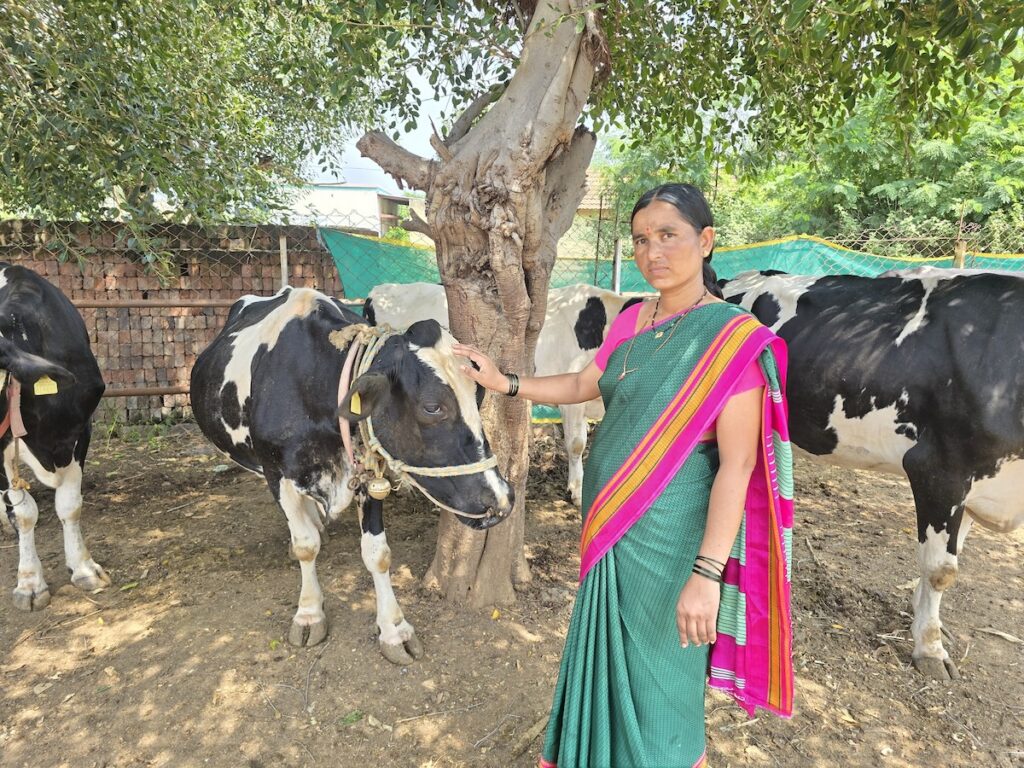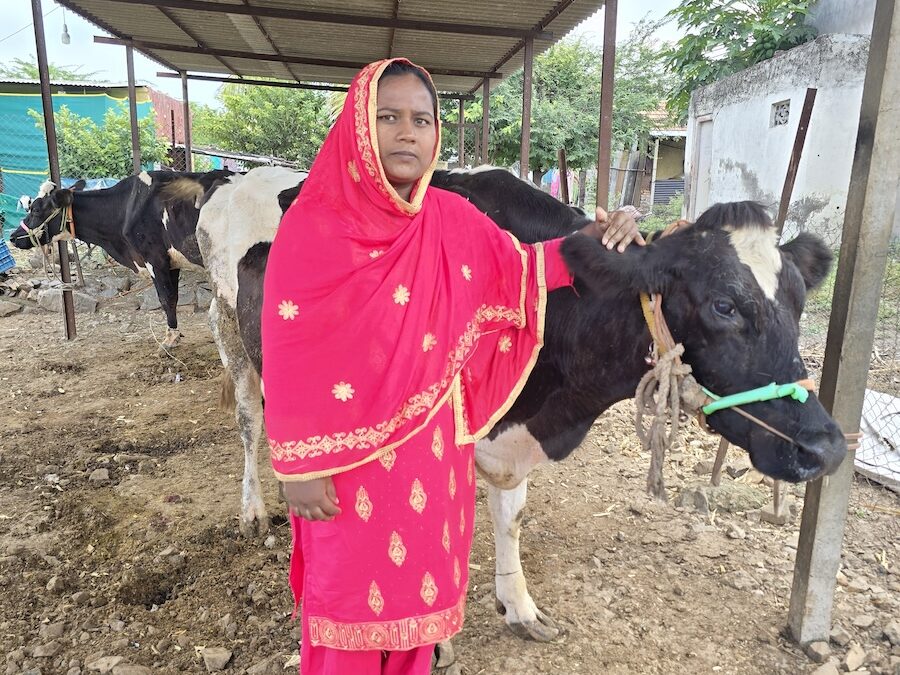Across India, 80 million rural households are engaged in dairy farming; the majority of them are small-scale operations. Though the country has the world’s highest population of dairy cattle and is the largest milk producer, overall productivity and profitability are quite low.
Dairy farmers in India grapple with numerous challenges that limit their potential, including:
- Low productivity per animal,
- Low or inadequate availability of quality feed and fodder,
- Inadequate treatment for diseases and deteriorating animal health,
- Adverse impacts of climate change on milk production and quality.
The Trust Dairy Project is working with farmers to surmount these challenges. The project is a collaboration between Solidaridad Asia, Nutreco, Govind Milk and Milk Products, and the Agricultural Development Trust of Baramati.
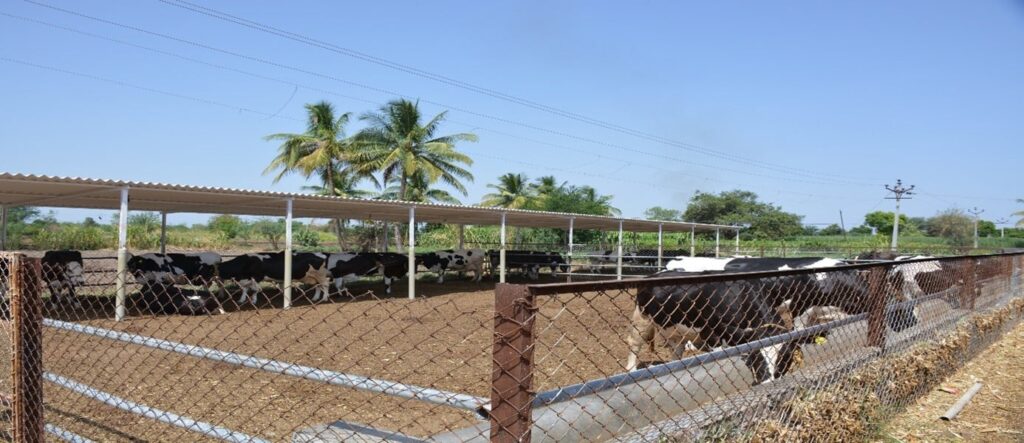
A Dairy Farmer Reinvents Herself
Kajal originally started out with four cows, each of which produced eight litres of milk each day (most breeds in India produce 10 or more liters daily). She struggled to maintain her farm and relied on open grazing of her animals without shelter of any kind. The cows were mostly fed unchopped grass and maize and no supplementary nutrient feed, which led to health issues, such as bloating. Along with that, water was available just twice a day and limited to 50 liters (instead of 75 to 80 litres, as recommended by the National Dairy Development Board).
It was hard work. Each day, Kajal milked her cows on her own by hand – a laborious, time-consuming and not-entirely-hygienic process. The animals also lacked proper healthcare and frequently suffered fevers and diseases such as mastitis.
“There was too much effort involved, and little to show for it. Despite running the farm day in, day out, my finances were in exceptionally poor shape, as I incurred heavy expenditures for buying fodder and the treatment of diseases, but the corresponding income was too low. At that point, I was no longer certain I could sustain my farm.”
Kajal Suved Shaikh, dairy farmer in the Satara district of Maharashrtra, India
Eventually, Govind Dairy, the company that buys Kajal’s milk, connected her with the Trust Dairy Project and she quickly found her footing taking trainings on every aspect of professional dairy farming. Kajal implemented proper nutrition management, better breeding techniques, and health and hygiene practices. She was also able to construct a holding area for her cattle, carried out deworming and vaccination on a regular basis, and provided better feed.
These interventions paid off handsomely, increasing milk production three times to 24 litres daily (per cow). At the same time, she was able to reduce her expenses, nearly tripling her monthly income, from ₹33,000 (€355) in 2021 to ₹92,400 (€994). Simultaneously, she began book-keeping and maintaining meticulous health records, and earned additional income from the natural fertilizer she produced from manure on the farm.
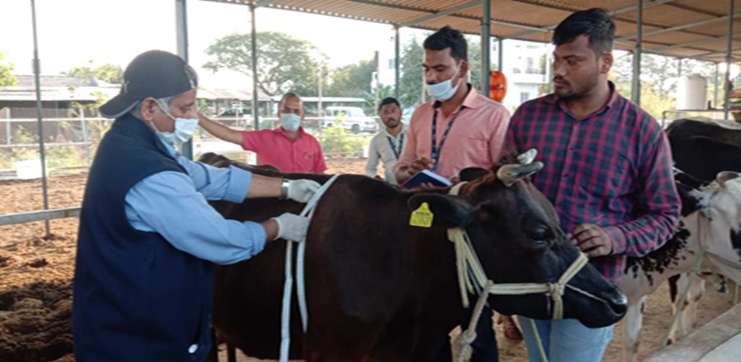
“Besides producing milk, there are additional products we can derive, such as natural fertilizers, nutrient-rich organic matter that can help farmers like me become financially independent,” says Kajal.
“I am now able to afford a good education for my children, build my own house, and be my own boss. With the right training and education, dairy farming can indeed be economical and sustainable.”
Sustainable Dairy Farming Goes Digital
Beyond the work of introducing better farm management practices, the Trust Dairy Project integrates traceability and other digital tools into the process.
“The integration of modern technologies into dairy farming is one of the most significant aspects of the projects,” says Mohd Dilshad, Senior Programme Manager – Sugarcane and Dairy, Solidaridad. A variety of portable tools have been deployed to garner useful insights and to educate farmers on sustainable farm management.
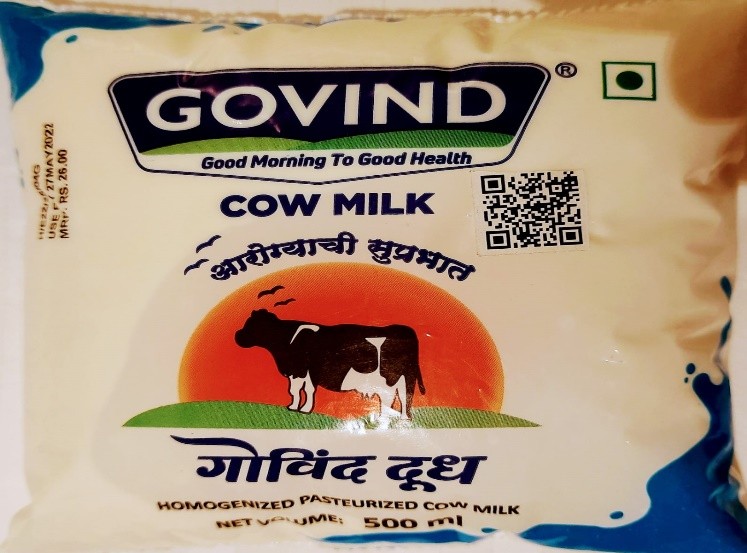
These tools include:
- The Cool Farm Tool – a carbon footprint calculator that provides standardized metrics for greenhouse gas emissions, biodiversity value, water use, food loss and waste,
- Mycomaster Plus – a device capable of detecting mycotoxins in feed and milk,
- NutriOpt Onsite Advisor – a machine used to map nutrients in raw feed material, forage, and final feed,
- Formulation as a Service (FaaS), a tool that helps dairy farmers create balanced diets for cattle by mixing forages, grains, protein feeds, minerals, vitamins, and additives. It also calculates the carbon dioxide (CO2) equivalent associated with feed and milk production, promoting sustainability.
- SoliTrace traceability tool – a software that captures the milk quality data and sustainability practices adopted by milk processors and producers that is made available to consumers through QR codes on packets.
“The successful implementation of Nutreco’s digital animal nutrition tools proved that even at a small-scale dairy farm, modern technologies can be deployed in innovative ways for very positive outcomes,” says Dr. Suyash Vardhan, Nutreco Regional Technical Advisor – Asia Pacific. “The dissemination of intelligent and useful modern dairy farming know-how not only increases its acceptability by small and marginal farmers but also helps improve their performance.”
The SoliTrace tool was critical to improving transparency and visibility in the dairy supply chain.
“By scanning the codes, customers could see the sustainable practices that farmers adopt, and the kind of testing done at the processor level. The project achieved great success in ensuring farmers’ economic welfare (especially women), animal welfare, and consumer connections,” says Dr. S. P. Gaikwad, General Manager – Dairy Development, Govind Milk And Milk Products Pvt. Ltd
Logging the outcomes of the Trust Dairy Project
The Trust Dairy project (2021-24) is rooted in a robust framework for small-scale dairy farming based on the adoption of sustainable and economically feasible dairy farming technologies. Key objectives of the project included increased productivity with fewer animals to reduce emissions from milk production, improved manure and feed management to reduce GHG emissions, and traceability in the dairy sector.
| ACTIVITIES | OUTCOMES |
| TRAINING 1,525 farmers from 89 villages have participated in more than 1,000 sessions on good dairy practices, including loose housing, nutrition and disease management, farm management and livelihood empowerment | 1,440 farmers adopted good practices by the end of the project 1,000 farmers were regenagri-certified 1,500 hectares of land were brought under sustainable agricultural management |
| ESTABLISHING MODEL FARMS 84 model farms with cattle holding ares were established over the duration of the project | Model farms saw a 14 percent increase in milk yield per cow, and a 42 percent increase in farmers’ monthly income |
| INSTALLATION OF BIODIGESTERS Over 700 biodigesters were installed in farmers’ households for domestic use. | ₹18,000 (€203.59) saved per annum per household by avoiding use of liquefied petroleum gas (LPG) and chemical fertilizers |
| ECO-FRIENDLY DAIRY PRODUCTION | The project reduced the average carbon footprint per kilogram of milk by 14 per cent |
| TRACEABILITY QR codes have been included in the milk packets of Govind Milk and Milk Products. Scanning the codes tells consumers about the quality of produce and sustainable practices adopted. | 1,000 consumers have been linked to producers through the use of these codes |
Says Sonali Rahul Bhujbal, a dairy farmer from Saswad village in Satara district, “Thanks to the Trust Dairy Project, my monthly income has increased more than four times [from ₹36,000 (€389) in 2021 to ₹147,000 (€1,589) currently]. I am now taking care of 10 cows of an improved breed that produce 240 litres of milk daily – way above the 40 litres I used to procure previously from six low-quality cows. Furthermore, the biodigester installed on my compound provides useful slurry for my agricultural farm.”
“Above all else, the project has helped women like us become socially and financially independent,” says Sonali.
